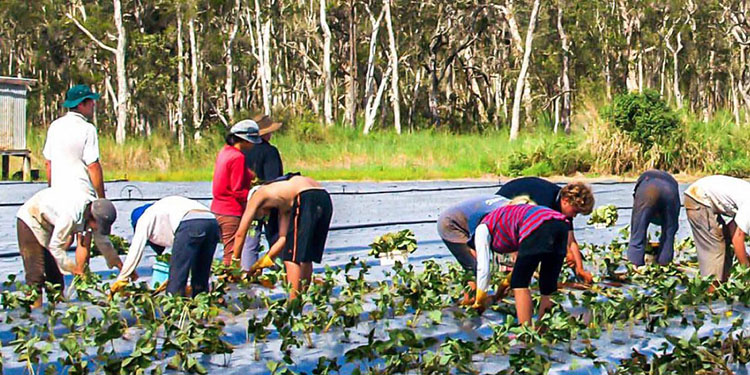A new report confirms that agricultural workers are being exploited and abused in Australia, with young foreign backpackers, seasonal migrants and Australian nationals among the victims.
The Retail Supply Chain Alliance of unions funded the investigation by McKell Institute into conditions during the blueberry harvest along the Mid North Coast of New South Wales.
Imported seasonal workers and backpackers were paid as little as A$4 a bucket to pick low-quality fruit, while others earnt just A$3 an hour – well below the legal rate of A$24 an hour.
The report found that “wage theft is a business model”, orchestrated by the intentional misinterpretation of pay rates.
Some workers said accommodation, transport, food, and even vital equipment like gloves and berry containers had to be bought directly from farm-owners, reducing daily earnings.
An Australian harvester, Natalie Trigwell, reported being forced to continue working while bushfires blazed nearby, saying she “couldn’t see the berries because of smoke… There was no phone reception, we couldn’t get alert messages, and [the contractors] wouldn’t let us leave.”
“It is like slave labour”
Another Australian woman was repeatedly called “a dog” when she asked to be paid. She said, “We worked for a company we don’t know the name of, contact number on the payslips isn’t connected. We were working without getting paid.”
And a 24-year-old British female said, “It is like slave labour.” She said one farmer boasted of much he earned, while under-paying labourers. “One farmer paid our labour hire contractor 25 per cent of what he makes. One week, he paid [my labour hire contractor] $50,000.
“The farmer showed me his bank statement one time… and he’s like ‘I make 150 to 200k a week…” That farmer was paying her A$6 per bucket, or $3/kilogram, well below the minimum award.
This woman had been exploited via Australia’s Working Holiday Maker program which allows 18 to 30-year-old-foreign nationals from some countries to conditionally live and work in Australia for a prescribed period.
Initially developed to promote a cultural exchange, the visa is now being used to plug labour shortages, requiring 88 days of prescribed regional work.
Many young foreign back packers being “coerced into unpaid work”
A Fair Work Ombudsman has reported, “Backpackers being lured to regional centres by dodgy labour hire operators, treating them poorly, bullying and sexually harassing them and [under paying] to the tune of hundreds — and sometimes thousands — of dollars per person.”
The investigators said many Working Holiday Makers reported being coerced into unpaid work.
The report said job ads promoting blueberry picking opportunities in Coffs Harbour on Chinese, Korean and Japanese language job-boards routinely offer wages below legal rates.
AWU National Secretary Andrew Walton, the spokesperson for the Retail Supply Chain Alliance Unions said, “Australian farms have developed an addiction to illegality and a domestic and international reputation as a place where you are likely to be [underpaid] or worse.
“This shocking new report can be added to the mountain of research indicating that Australian farms have become a hotbed of wage theft, exploitation, and worker abuse.
“This is a sector defined by and built on illegality. By turning a blind eye, the government has created a system of rules and structures that rewards labour abusers and punishes those operators doing the right thing.”
The “Blue Harvest” report recommends a crackdown on rogue recruiters (often operating through social media), stronger penalties, greater enforcement from workplace investigators, reforms of Australia’s visa schemes and new laws to ensure farmers are required to pay a minimum hourly rate.
Andrew Walton said, “It doesn’t need to be this way. Developed nations can produce abundant horticultural exports without relying on labour exploitation to subsidise their product.
“Australia needs to decide if we want to take the ethical, high-productivity route or the unethical, labour exploitation route.
“We need a root and branch examination of the sector and a Royal Commission is the ideal vehicle.”
The report follows The Migrant Workers Taskforce, commissioned by the Australian government in 2017, that found half of almost 880,000 migrant workers in the country were be being underpaid.























